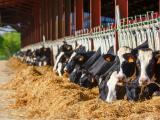May 18, 2010
Los Angeles mumps cases have East Coast link
Los Angeles County is reporting nine mumps cases, four of which may be related to an ongoing outbreak affecting Hasidic Jewish populations on the East Coast, the Los Angeles Times reported on May 16. A Beverly Hills pediatrician told the Times that he treated two of the patients and that the cases may be linked to travel to the East Coast about 6 weeks ago for Passover celebrations. The county health department said at least nine mumps cases have been reported so far, six of which have been confirmed, according to a May 11 press release. Dr Jonathan Fielding, public health director, said the county has typically averaged between five and seven cases over the past 3 years. He said the local cases had links to congregate settings such as schools, colleges, and community centers. Fielding urged area residents to be alert for any signs of the disease and to protect themselves by getting the measles-mumps-rubella (MMR) vaccine.
May 16 Los Angeles Times story
May 11 LA County Public Health press release
Utah links pair of illness clusters to raw milk
Public health officials in Utah are investigating two distinct clusters of illnesses linked to drinking raw milk, one involving Campylobacter and the other Salmonella, according to a May 16 press release. Nine patients from three counties in the northern part of the state are in the Campylobacter cluster and six patients from three central counties near Salt Lake City are reportedly in the Salmonella cluster so far. All of the patients said they had drunk raw milk from state-licensed local vendors. Testing of raw milk from the dairy that reportedly produced the Salmonella-tainted milk tested positive for the pathogen in samples produced from Apr 5 to Apr 22 but not in samples from Apr 22 through Apr 30. Coliform testing at the northern Utah dairy associated with the Campylobacter cases showed high counts, which may be linked to disease pathogens in the milk. State health officials warned residents that purchasing raw milk even from licensed sellers doesn't guarantee that the product is safe. They said further that infants, young children, pregnant women, and other high-risk groups should avoid consuming raw milk and its products.
USDA offers guidance on reducing E coli shedding in cattle
The US Department of Agriculture's Food Safety and Inspection Service (FSIS) recently released guidance to help beef producers reduce Eschericia coli O157:H7 shedding in cattle. The 28-page document is designed to be a resource to producers and discusses the most current scientific findings behind a range of interventions, from feeding strategies to transportation practices. It said that no preharvest intervention has been shown to eliminate E coli shedding but that at least two preharvest interventions, certain probiotics, and vaccines might reduce shedding. Over the next 60 days FSIS is soliciting comments on the new guidance.
USDA guidance on preharvest measures to reduce E coli O157:H7 shedding in cattle
Avian flu outbreak reported in West Bank
An outbreak of avian influenza in a West Bank community northeast of Tel Aviv has prompted the culling of 250,000 chickens, the United Nations Integrated Regional Information Network (IRIN) reported today. The report did not specify the flu subtype but clearly implied it was H5N1. The outbreak occurred in Bala village in the Tel Karem area, a major area for egg and poultry production, the story said. Products from the area are often smuggled into Israel because of higher prices there, and the outbreak has prompted Israeli authorities to tighten supervision at border crossings, the report said. Israel's agriculture minister, Shalom Simchon, said Israel assisted the Palestinian Authority by providing drugs needed for the poultry culling, and he called on international organizations to compensate Palestinian farmers for their losses. Earlier this month, Israeli officials reported finding H5N1 in two emus in a small zoo near the Dead Sea.
May 18 IRIN report
WHA endorses continued negotiations on virus sharing
In committee action at the World Health Assembly (WHA) yesterday, World Health Organization (WHO) member states called for continuing efforts to strengthen the sharing of influenza viruses and flu vaccines in the interest of pandemic flu preparedness, the WHO reported. The meeting saw the passage of a draft resolution urging the WHO director-general to continue to support the efforts of the Open-Ended Working Group on these issues. Members described the May 10-12 meeting of the intergovernmental group on this topic as "transparent, substantive, collaborative and an important foundation for future negotiation in this area," the WHO said in a statement. The draft resolution calls on the WHO executive board to report on the negotiations again at next year's WHA meeting. Efforts to improve virus sharing began after Indonesia stopped sending H5N1 avian influenza virus samples to the WHO about 3 years ago, saying developing countries couldn't afford to buy vaccines derived from the virus samples they supplied.
WHO report on May 17 session of WHA meeting


















